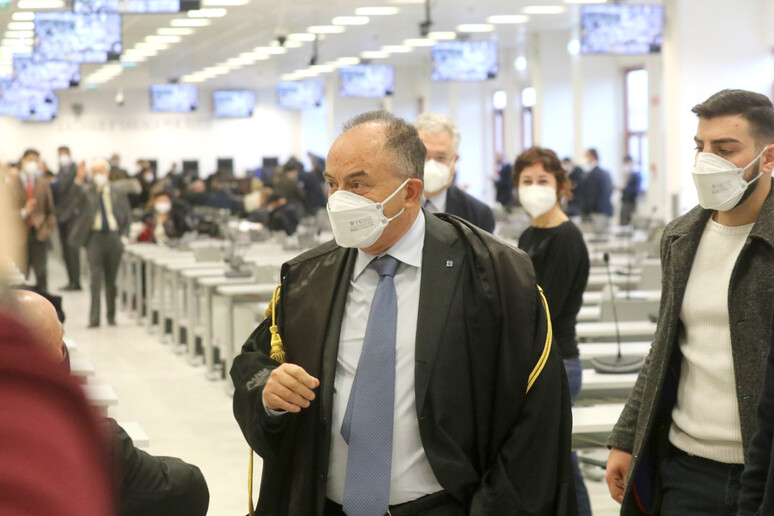The biggest ever trial into
Italy's most powerful mafia, the Calabria-based 'Ndrangheta, got
under way at Lamezia Terme on Wednesday.
The trial delves into the activities of the 'Ndrangheta clans in
Vibo Valentia and their links to the political, institutional,
economic and rogue Masonic worlds controlling all aspects of
local life in Calabria.
It is the biggest mafia trial in Italy since the so-called
'maxi-trial' of Cosa Nostra in Sicily from 1986 to 1992.
The trial, which is expected to last around three years, has
over 300 defendants who are facing over 400 charges.
It is taking place in a converted call centre that has been
turned into a 'bunker' in the industrial area of Lamezia Terme.
Reporters from major global news outlets including The Times,
the BBC, the Associated press, and Agence France Press, as well
as major broadcasters, have flocked to the trial.
But the filming of the proceedings has been banned.
The prosecution is being led by Catanzaro Chief Prosecutor
Nicola Gratteri, one of Italy's best-known anti-mafia
investigators.
Gratteri, 62, has been living in round-the-clock police
protection for over 30 years.
Talking to AFP ahead of the trial, Gratteri said it would aim to
ease the "asphyxiating" hold of 'Ndrangheta on Calabrian life.
On Wednesday Gratteri said "£succeeding in holding the trial
here means that the Calabrians are not a people who leave things
unfinished and that when we all sit at the same table it is
possible to achieve complete works where a great efficiency is
achieved.
"It is important that the trial is taking place in Calabria.
"It is a sign that people can trust us, that we can give
answers.
"This has also been proven by the increasing numbers of people
who have reported ('Ndrangheta crimes".
'Ndrangheta has grown into Italy's most powerful and richest
mafia thanks to its control of the European cocaine trade.
Its tentacles have spread to the whole of Italy and all over the
world.
Italian police have gradually been digging behind the wall of
silence or omerta' that for 'Ndrangheta is even more
impenetrable than that of Sicily's Cosa Nostra.
In January 2015 police arrested more than 160 people in the
biggest-ever operation against a northern business arm of
'Ndrangheta.
The op showed how far the one-time southern kidnapping gangs -
long poor relations to Sicily's Cosa Nostra but now
grown plump on cocaine cash - had infiltrated the economy of
Italy's most affluent regions, especially the thriving economy
of Reggio Emilia around Bologna.
Other probes have shown 'Ndrangheta infiltration in the region
around Milan, Lombardy, the region around Genoa, Liguria, and
the region around Turin, Piedmont.
In February 2014 a major Italian-FBI bust showed that
'Ndrangheta was muscling in on the drug operations of one of
Cosa Nostra's historic five families in New York, the Gambinos.
Before that, in July 2010, a massive police operation netted the
head of the 'Ndrangheta and 300 others.
Domenico Oppedisano, 80, anointed the equivalent of the 'boss of
bosses' in Cosa Nostra at a Calabrian shrine to the
Madonna a year previously, was caught along with their reputed
head in Lombardy, Pino Neri.
'Ndrangheta is so secretive that the replacement for Oppedisano
is still not known.
'Ndrangheta (from a Greek word meaning 'heroism' or 'virtue')
once lived in the twin shadow of Cosa Nostra in Sicily and the
Camorra in Naples.
While those two syndicates, notably the Sicilians, were feeding
off the transatlantic heroin trade through operations like the
infamous 'French connection', 'Ndrangheta was only just emerging
from its traditional stock-in-trade of kidnappings in the
Calabrian highlands.
It has since become a highly sophisticated global network with a
chokehold on the European cocaine trade and control over swathes
of its home turf where police fear to tread, Italian officials
say.
As well as being the richest, 'Ndrangheta is also regarded as
the most impenetrable of Italy's mafias, with its close-knit
family-based organisation outdoing the Sicilian mafia in its
ability to defeat police efforts to turn members into State
witnesses.
The European law enforcement agency Europol has identified the
'Ndrangheta mafia as one of the "most threatening" organized
crime groups on the global level, due to its "enormous financial
might" and "immense corruptive power," with a presence in
Germany, Spain, the Netherlands, France, Belgium, Switzerland,
Canada, US, Colombia and Australia, where 'Ndrangheta turf wars
have gained headlines.
In Europe, 'Ndrangheta really only came into the public eye in
2007, when six clan members were gunned down on the midsummer
Ferragosto holiday in the German city of Duisburg in a feud that
began as a wedding spat in a small Calabrian coastal town, san
Luca, in 1991.
A string of 'Ndrangheta-linked businesses have been seized in
the last few years all over northern Italy, and especially in
the affluent Lombard belt around Milan, and a Lombardy regional
councillor was placed under investigation for buying votes from
transplanted clans.
On the Italian Riviera, the town councils of Bordighera and
Ventimiglia were dissolved for 'Ndrangheta infiltration in 2011
and 2012, the first non-Calabrian municipalities to be wound up
because of such penetration.
In Rome, the Calabrian Mob has laundered money in a string of
plum properties, as attested to by recent seizures police
say are only the tip of the iceberg.
In November 2013 Grand Hotel Gianicolo, a former monastery
converted into a four-star hotel for the Catholic Church's
Jubilee in 2000, was seized from Calabrian businessmen linked to
'Ndrangheta.
It is one of the swankiest properties on the hill, Gianicolo or
Janiculum, that affords one of the most breathtaking views
over Rome.
Ten years ago a former Dolce Vita-era bar and restaurant on the
storied Via Veneto, the Caffe' De Paris, turned out to be
in the hands of the Calabrian Mob.
More recently, gangsters involved in a hitherto-unknown Rome
crime organisation that allegedly had fingers in a web of
business and political operations were said to have links to
other mafias including 'Ndrangheta.
ALL RIGHTS RESERVED © Copyright ANSA











